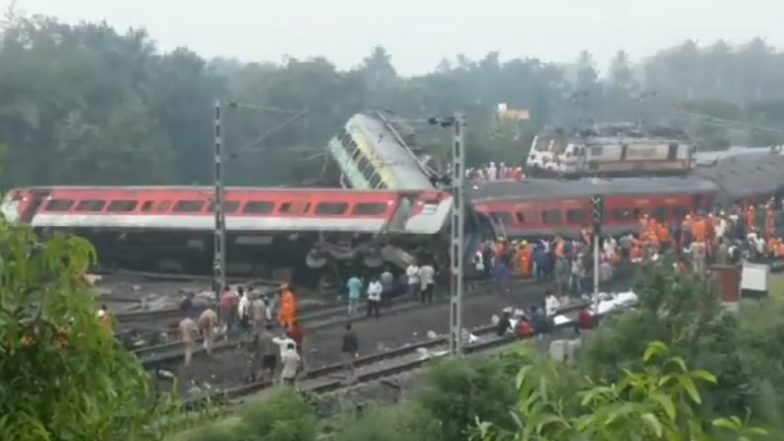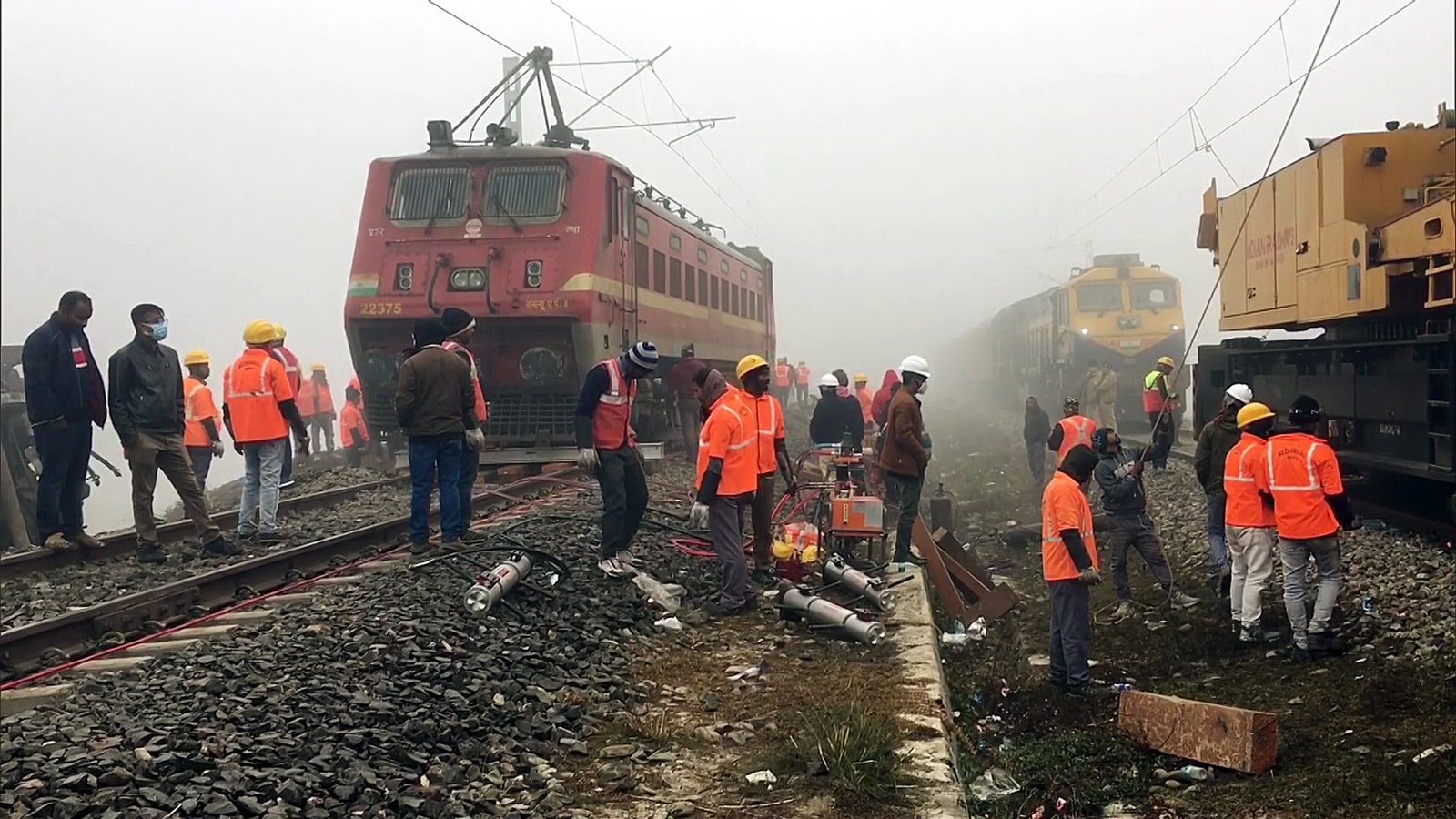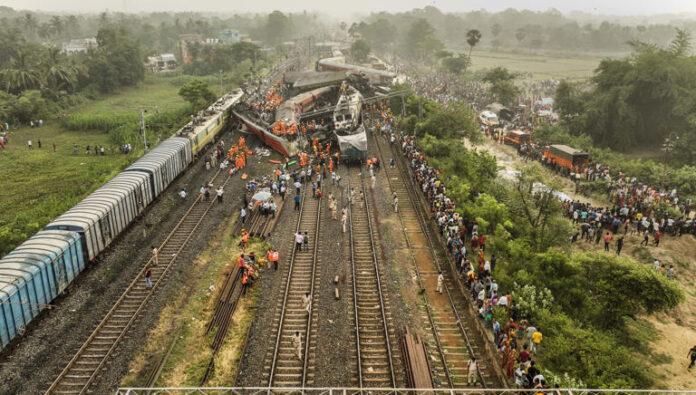In a devastating incident that unfolded on Friday evening in Odisha’s Balasore district, three trains collided, resulting in an immense loss of life. The catastrophic mishap has claimed the lives of at least 288 individuals, with over 900 others sustaining injuries. The National Disaster Response Force (NDRF) has been diligently working to rescue survivors, expressing hope to locate more victims alive amidst the wreckage.
The sequence of events began when the 2841 Shalimar-Chennai Coromandel Express collided with a goods train near Bahanagar Bazar Railway Station at approximately 6:55 PM. As a result of the collision, 15 coaches of the Coromandel Express derailed. Tragically, the 12864 Bengaluru – Howrah Superfast Express then collided with the derailed Coromandel Express, exacerbating the magnitude of the disaster.
Tragic Triple Train Collision Claims Hundreds of Lives in Odisha Mishap; A Historical Perspective on Past Railway Accidents
Atul Karwal, the Director General of the NDRF, described the accident as one of the most tragic incidents in terms of casualties in the country’s history. Over 300 individuals have been rescued thus far by the nine NDRF teams deployed at the site. The rescue operations have been arduous, as the impact of the collision left the coaches severely mangled. Karwal expressed the aim to conclude the rescue efforts promptly and emphasised the utmost care being taken to ensure the safety of any survivors still trapped within the wreckage.
This grim incident serves as a somber reminder of the history of major train accidents in India. Let us take a retrospective look at some of the notable incidents: October 19, 2018: In Punjab’s Amritsar, a train plowed into a crowd of Dusherra spectators, claiming the lives of 59 individuals and leaving over 100 others injured.
November 20, 2016: The Pukhrayan train derailment occurred when the 19321 Indore–Rajendra Nagar Express veered off track, causing 14 coaches to derail near Pukhrayan, approximately 60 km from Kanpur in Uttar Pradesh. The tragedy resulted in the death of 152 individuals, with over 250 passengers sustaining injuries.
May 28, 2010: The Jnaneswari Express derailed near Khemashuli and Sardiha stations in Maharashtra when the Howrah–Lokmanya Tilak Terminus Jnaneswari Super Deluxe Express collided with an oncoming freight train. The accident claimed the lives of at least 140 individuals and left around 200 injured.
October 29, 2005: In Andhra Pradesh’s Valigonda, the Delta Fast Passenger train derailed after a flash flood swept away a small rail bridge. This calamity resulted in the loss of at least 114 lives, with over 200 individuals sustaining injuries.
September 9, 2002: The Howrah Rajdhani Express derailed on a bridge between Gaya and Dehri-on-Sone stations in Bihar, causing two coaches to plunge into a river. Over 140 individuals lost their lives in this tragic accident. August 2, 1999: The collision between the Brahmaputra Mail and the stationary Avadh Express at Gaisal station in West Bengal’s Uttar Dinajpur district claimed the lives of at least 285 individuals, with over 300 others injured. The accident was attributed to a signaling error. November 26, 1998: Near Khanna in Punjab, the Jammu Tawi–Sealdah Express collided with three derailed coaches of the Frontier Golden Temple Mail, resulting
August 5, 1997: Two Coromandel Express trains collided between Visakhapatnam in Andhra Pradesh and Brahmapur in Odisha, claiming the lives of 75 individuals. One train was en route from Howrah, while the other was traveling from Chennai. Two years later, on August 15, 1999, another Coromandel Express train derailed at Dusi crossing near the Nagavalli river, resulting in the loss of 50 passengers’ lives.
August 20, 1995: The Purushottam Express collided with the stationary Kalindi Express near Firozabad in Uttar Pradesh, leading to the tragic demise of approximately 350 people. The accident occurred while most passengers were asleep aboard the train.
July 8, 1988: An express train derailed on the Peruman bridge over Ashtamudi Lake near Kollam in Kerala, causing the deaths of 106 individuals. Ten carriages of the train plunged into the water. June 6, 1981: More than 300 lives were lost when a train derailed and plunged into the Bagmati River in Bihar while crossing a bridge.
Catastrophic Triple Train Collision Devastates Odisha: Reflecting on Historical Railway Accidents to Understand the Scale of Tragedy
These past incidents serve as stark reminders of the vulnerabilities and risks associated with railway travel. Each tragedy has left an indelible mark on the nation, highlighting the need for continuous efforts to prioritise safety measures and enhance the resilience of India’s railway infrastructure.
As the nation mourns the lives lost in the recent Odisha mishap, it is imperative that we reflect on these historical incidents and strive for comprehensive reforms. The safety and well-being of passengers must remain at the forefront of our collective consciousness. By learning from the past, implementing necessary measures, and fostering a culture of accountability, we can endeavour to prevent such devastating accidents in the future.
In the wake of this heart-wrenching tragedy, it is crucial that the affected families receive the support they need to cope with their immense loss. Financial aid, counseling services, and other forms of assistance should be extended to help them navigate this challenging journey of healing and rebuilding.
Moving forward, it is incumbent upon the authorities to prioritise the safety of the railway network. Adequate investments should be made to upgrade infrastructure, leverage advanced technologies, and establish robust maintenance practices. Regular safety audits and inspections must be conducted to identify and address potential risks proactively.
The Odisha railway accident stands as a solemn reminder of the collective responsibility we bear in ensuring the safety of our railways. It is not just the duty of railway authorities but also the passengers themselves to remain vigilant and promptly report any safety concerns. By joining forces and implementing necessary reforms, we can strive to prevent such devastating accidents, safeguarding the lives of those who rely on the railways for transportation.
As we mourn the loss of countless innocent lives, let us channel our grief into action. Let us honor the memory of the victims by committing ourselves to the establishment of a safer and more reliable railway system that places the well-being and security of every passenger above all else. Only through our collective efforts can we pave the way for a brighter and safer future of railway travel in India.

